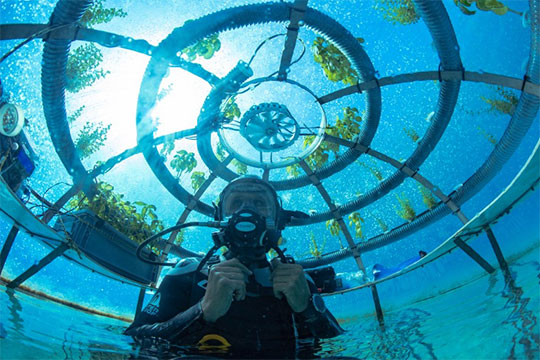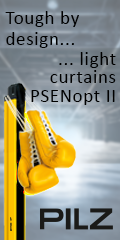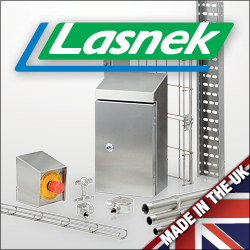
Posted to News on 8th Apr 2022, 11:41
Siemens enables underwater farming revolution with digital twin
Siemens Digital Industries Software reports that Nemo's Garden, a startup focused on sustainable underwater cultivation of crops, has deployed Siemens' Xcelerator portfolio of software and services to shorten its innovation cycles and move more rapidly towards industrialisation and scale.

Nemo’s Garden was founded in 2021 by Sergio Gamberini, president of Italian scuba diving equipment manufacturer, Ocean Reef Group, and his son, Luca Gamberini. Their team of engineers, divers and scientists have been working to prove the viability of cultivating herbs, fruit and vegetables underwater.
Nemo’s Garden’s key innovation, a sub-aqua biosphere, is a unique type of underwater greenhouse, able to harness the positive environmental factors of the ocean – temperature stability, evaporative water generation, CO2 absorption, the abundance of oxygen and inherent protection from pests – to create an environment ideal for crop cultivation.
The team has not only successfully harvested a variety of crops from its prototype biospheres, but also discovered that plants grown in this environment are nutritionally richer than those grown traditionally. The next big hurdle in achieving their goal was to turn this prototype into a solution that could be deployed globally; however, they didn’t want to wait another 10 years to make that happen.
Harsh winters, short summers and initial seafloor-use permit limitations capped Nemo’s Garden to one growth cycle a year, which has meant only one innovation cycle per annum. Design changes, lengthy physical testing and heavy manual monitoring processes during the growth cycle led the Nemo’s Garden team to seek out ways to speed up their innovation and scale the operation. The team reached out to TekSea’s Matteo Cavalleroni for insight on how to leverage cutting edge technologies to achieve their goals. After the initial consultation, Siemens was invited to join the project, leveraging the Xcelerator portfolio of software and its services to help Nemo’s Garden get to the next stage of development and get ready for industrialisation and commoditisation.
“When I first saw Siemens’ digital twin technology, I was mesmerised. Nemo’s Garden is a one-of-a-kind system and we need to adapt to each environment where it is to be installed. If you can model that environment virtually before you start, you can foresee the challenges and address them in the best way,” said Luca Gamberini. “We have seen benefits in understanding the flow of water around the shapes of our biospheres. We have a greater understanding of the points of stress on the structure around the biospheres. We also understand how the different interactions of the solar radiation, the temperature and all the physical factors, act on the plants. All thanks to the ability of the digital twin to replicate our system.”
A comprehensive digital twin of the Nemo’s Garden biosphere has been built that encompasses not only its design evolution using Siemens’ NX software, but also enables simulation of the growing conditions within it, the impact of the equipment on the body of water, as well as the full environment in which they are installed – all accomplished using Siemens’ Simcenter STAR-CCM+ software.
The Nemo’s Garden team are no longer limited by weather conditions, seasonality and short growing seasons or limitations on diving and monitoring. Adaptations to the biospheres can be tested in the virtual world, enabling the team to refine the design at a massively accelerated rate.
In addition to engineering the physical biosphere, Nemo’s Garden also needed to optimise and scale the processes for growing, tracking, and harvesting the plants. To create a sustainable business that did not rely on sending trained divers to collect data, a fully digital, automated approach was created that drew on Siemens’ extensive experience in leveraging software to automate traditional farming practices.
Existing video of the growing cycles along with reference data from traditional farming operations of the same target crops, at various growth stages and health conditions was analysed using Siemens’ MindSphere service. From this, Siemens was able to train a machine learning algorithm to monitor plant growth as well as the environmental conditions within the domes.
When this algorithm is deployed onto Siemens’ Industrial Edge computing devices in each biosphere, the plants can be monitored via a cloud-based dashboard throughout the season, from anywhere, in real time. Next season, these Industrial Edge devices will be connected to actuators – to automatically adjust air circulation, humidity, irrigation and nutritional dosing throughout the whole season. This will be the foundation of a global agricultural service, optimised for subsea operations and tuned for each of the world’s oceans.
Through true adoption of digital transformation, Nemo’s Garden has taken something that began as a light-hearted challenge over dinner with friends and are turning this unique concept into a commercially viable subsea farming platform that can sustainably be deployed globally. While the newly designed biospheres will not be deployed until the next growing season, thanks to the comprehensive digital twin of the growing environment the team continues to push forward with plans to further optimise their designs and automate their processes for global deployment.
“Digitalisation isn’t only for big companies; it is for all companies. In fact, great gains can often be realized in smaller or start-up companies. The work we do with startups can amplify the impact they have on the world, aiding in and speeding up innovation,” said Eryn Devola, vice president of sustainability at Siemens Digital Industries Software. “It is easy to get excited when you we find a passionate team with human-centred technology that is working to feed people while having a positive impact on the environment.”
Siemens Digital Industries Software
Faraday House
Sir William Siemens Square
GU16 8QD
UNITED KINGDOM
+44 (0)1276 413200


















